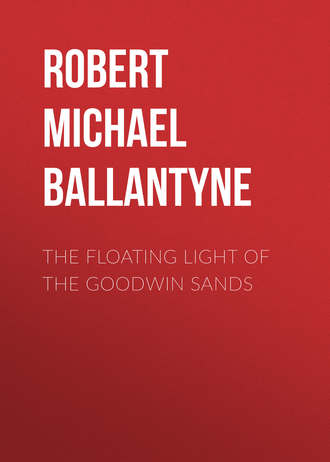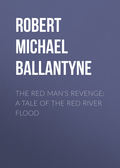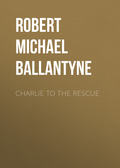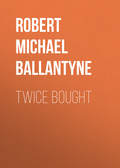
Robert Michael Ballantyne
The Floating Light of the Goodwin Sands
“You see we require stronger tackle,” said the captain to Stanley, while the buoy was being slowly raised. “That buoy weighs fully three-quarters of a ton, and cost not less, along with its chain and sinker, than 150 pounds, yet it is not one of our largest. We have what we call monster buoys, weighing considerably more than a ton, which cost about 300 pounds apiece, including a 60-fathom chain and a 30-hundred-weight sinker. Those medium-sized ones, made of wood and hooped like casks, cost from 80 pounds to 100 pounds apiece without appendages. Even that small green fellow lying there, with which I intend to mark the Nora, if necessary, is worth 25 pounds, and as there are many hundreds of such buoys all round the kingdom, you can easily believe that the guarding of our shores is somewhat costly.”
“Indeed it must be,” answered Stanley; “and if such insignificant-looking things cost so much, what must be the expense of maintaining floating lights and lighthouses?”
“I can give you some idea of that too,” said the captain—
“Look out!” exclaimed the men at that moment.
“Och! be aisy,” cried Jerry, ducking as he spoke, and thus escaping a blow from the buoy, which would have cracked his head against the vessel’s side like a walnut.
“Heave away, lad!”
The man at the windlass obeyed. The irresistible steam-winch caused the huge chain to grind and jerk in its iron pulley, and the enormous globular iron buoy came quietly over the side, black here and brown there, and red-rusted elsewhere; its green beard of sea-weed dripping with brine, and its sides grizzled with a six-months’ growth of barnacles and other shell-fish.
It must not be supposed that, although the engine did all the heavy lifting, the men had merely to stand by and look on. In the mere processes of capturing the buoy and making fast the chains and hooks, and fending off, etcetera, there was an amount of physical effort—straining and energising—on the part of the men, that could scarcely be believed unless seen. Do not fancy, good reader, that we are attempting to make much of a trifle in this description. Our object is rather to show that what might very naturally be supposed to be trifling and easy work, is, in truth, very much the reverse.
The buoy having been lifted, another of the same size and shape, but freshly painted, was attached to the chain, tumbled over the side, and left in its place. In this case the chain and sinker did not require renewing, but at the next (one) visited it was found that buoy, chain, and sinker had to be lifted and renewed.
And here again, to a landsman like Stanley, there was much to interest and surprise. If a man, ignorant of such matters, were asked what he would do in the event of his having to go and shift one of those buoys, he might probably reply, “Well, I suppose I would first get hold of the buoy and hoist it on board, and then throw over another in its place;” but it is not probable that he would reflect that this process involved the violent upturning of a mass of wood or metal so heavy that all the strength of the dozen men who had to struggle with it was scarce sufficient to move gently even in the water; that, being upturned, an inch chain had to be unshackled—a process rendered troublesome, owing to the ponderosity of the links which had to be dealt with, and the constrained position of the man who wrought,—and that the chain and sinker had to be hauled out of the sand or mud into which they had sunk so much, that the donkey-engine had to strain until the massive chains seemed about to give way, and the men stood in peril of having their heads suddenly cut open.
Not to be too prolix on this subject, it may be said, shortly, that when the chain and sinker of the next buoy were being hauled in, a three-inch rope snapped and grazed the finger of a man, fortunately taking no more than a little of the skin off, though it probably had force enough to have taken his hand off if it had struck him differently. Again they tried, but the sinker had got so far down into the mud that it would not let go. The engine went at last very slowly, for it was applying almost the greatest strain that the chains could bear, and the bow of the tender was hauled considerably down into the sea. The men drew back a little, but, after a few moments of suspense, the motion of the vessel gradually loosened the sinker and eased the strain.
“There she goes, handsomely,” cried the men, as the engine again resumed work at reasonable speed.
“We sometimes lose chains and sinkers altogether in that way,” remarked Dick Moy to Billy, who stood looking on with heightened colour and glowing eyes, and wishing with all the fervour of his small heart that the whole affair would give way, in order that he might enjoy the tremendous crash which he thought would be sure to follow.
“Would it be a great loss?” he asked.
“It would, a wery great un,” said Dick; “that there chain an’ sinker is worth nigh fifty or sixty pound.”
While this work was being done, the captain was busy with his telescope, taking the exact bearings of the buoy, to ascertain whether or not it had shifted its position during the six months’ conflict with tide and tempest that it had undergone since last being overhauled. Certain buildings on shore coming into line with other prominent buildings, such as steeples, chimneys, and windmills, were his infallible guides, and these declared that the buoy had not shifted more than a few feet. He therefore gave the order to have the fresh buoy, with its chain and sinker, ready to let go.
The buoy in question,—a medium one about eight feet high, five feet in diameter, and conical in shape—stood at the edge of the vessel, like an extinguisher for the biggest candle that ever was conceived in the wildest brain at Rome. Its sinker, a square mass of cast-iron nearly a ton in weight, lay beside it, and its two-inch chain, every link whereof was eight or ten inches long, and made of the toughest malleable iron, was coiled carefully on the main-hatch, so that nothing should impede its running out.
“All ready?” cried the captain, taking a final glance through the telescope.
“All ready, sir,” replied the men, several of whom stood beside the buoy, prepared to lay violent hands on it, while two stood with iron levers under the sinker, ready to heave.
“Stand here, Billy, an’ you’ll see it better,” said Dick Moy, with a sly look, for Dick had by this time learned to appreciate the mischievous spirit of the urchin.
“Let go!” cried the captain.
“Let go!” echoed the men.
The levers were raised; the thrust was given. Away went the sinker; overboard went the buoy; out went the chain with a clanging roar and a furious rush, and up sprang a column of white spray, part of which fell in-board, and drenched Billy Towler to the skin!
As well might Dick Moy have attempted to punish a pig by throwing it into the mud as to distress Billy by sousing him with water! It was to him all but a native element. In fact, he said that he believed himself to be a hamphiberous hanimal by nature, and was of the opinion that he should have been born a merman.
“Hooray! shower-baths free, gratis, for nothink!” he yelled, as soon as he had re-caught his breath. “Any more o’ that sort comin’?” he cried, as he pulled off his shirt and wrung it.
“Plenty more wery like it,” said Dick, chuckling, “and to be had wery much on the same terms.”
“Ah, if you’d only jine me—it would make it so much more pleasant,” retorted the boy; “but it would take a deal more water to kiver yer huge carcase.”
“That boy will either make a first-rate man, or an out-and-out villain,” observed the captain to Stanley, as they stood listening to his chaffing remarks.
“He’ll require a deal of taming,” said Jim Welton, who was standing by; “but he’s a smart, well-disposed little fellow as far as I know him.”
Morley Jones, who was seated on the starboard bulwarks not far off; confided his opinion to no one, but he was observed to indulge in a sardonic grin, and to heave his shoulders as if he were agitated with suppressed laughter when this last remark was made.
The steamer meanwhile had been making towards another of the floating lights, alongside of which some time was spent in transferring the full water-casks, receiving the “empties,” etcetera, and in changing the men. The same process was gone through with the other vessels, and then, in the afternoon, they returned towards Ramsgate harbour. On the way they stopped at one of the large buoys which required to be painted. The weather being suitable for that purpose, a boat was lowered, black and white paint-pots and brushes were put into her, and Jack Shales, Dick Moy, and Jerry MacGowl were told off to perform the duty. Stanley Hall also went for pastime, and Billy Towler slid into the boat like an eel, without leave, just as it pushed off.
“Get out, ye small varmint!” shouted Jerry; but the boy did not obey; the boat was already a few feet off from the vessel, and as the captain either did not see or did not care, Billy was allowed to go.
“You’ll only be in the way, an’ git tired of yer life before we’re half done,” said Dick Moy.
“Never mind, he shall keep me company,” said Stanley, laughing. “We will sit in judgment on the work as it proceeds—won’t we, Billy?”
“Well, sir,” replied the boy, with intense gravity, “that depends on whether yer fine-hart edication has bin sufficiently attended to; but I’ve no objection to give you the benefit o’ my adwice if you gits into difficulties.”
A loud laugh greeted this remark, and Billy, smiling with condescension, said he was gratified by their approval.
A few minutes sufficed to bring them alongside the buoy, which was one of the largest size, shaped like a cone, and painted in alternate stripes of white and black. It rose high above the heads of the men when they stood up beside it in the boat. It was made of timber, had a wooden ring round it near the water, and bore evidence of having received many a rude buffet from ships passing in the dark.
“A nice little buoy this,” said Billy, looking at it with the eye and air of a connoisseur; “wot’s its name?”
“The North Goodwin; can’t ’ee read? don’t ’ee see its name up there on its side, in letters as long as yerself?” said Jack Shales, as he stirred up the paint in one of the pots.
“Ah, to be sure; well, it might have bin named the Uncommon Good-win,” said Billy, “for it seems to have seen rough service, and to have stood it well. Come, boys, look alive, mix yer colours an’ go to work; England expecks every man, you know, for to do his dooty.”
“Wot a bag of impudence it is!” said Dick Moy, catching the ring-bolt on the top of the buoy with the boat-hook, and holding the boat as close to it as possible, while his mates dipped their brushes in the black and white paint respectively, and began to work with the energy of men who know that their opportunity may be cut short at any moment by a sudden squall or increasing swell.
Indeed, calm though the water was, there was enough of undulation to render the process of painting one of some difficulty, for, besides the impossibility of keeping the boat steady, Dick Moy found that all his strength could not avail to prevent the artists being drawn suddenly away beyond reach of their object, and as suddenly thrown against it, so that their hands and faces came frequently into contact with the wet paint, and gave them a piebald appearance.
For some time Billy contented himself with looking on and chaffing the men, diversifying the amusement by an occasional skirmish with Stanley, who had armed himself with a brush, and was busy helping.
“It’s raither heavy work, sir, to do all the judgment business by myself;” he said. “There’s that feller Shales, as don’t know how a straight line should be draw’d. Couldn’t ye lend me your brush, Jack? or p’raps Dick Moy will lend me his beard, as he don’t seem to be usin’ it just now.”
“Here, Dick,” cried Stanley, giving up his brush, “you’ve had enough of the holding-on business; come, I’ll relieve you.”
“Ay, that’s your sort,” said Billy; “muscle to the boat-’ook, an’ brains to the brush.”
“Hold on tight, sir,” cried Shales, as the boat gave a heavy lurch away from the buoy, while the three painters stood leaning as far over the gunwale as was consistent with safety, and stretching their arms and brushes towards the object of their solicitude.
Stanley exerted himself powerfully; a reactionary swell helped him too much, and next moment the three men went, heads, hands, and brushes, plunging against the buoy!
“Och! morther!” cried Jerry, one of whose black hands had been forced against a white stripe, and left its imprint there. “Look at that, now!”
“All right,” cried Shales, dashing a streak of white over the spot.
“There’s no preventing it,” said Stanley, apologetically, yet laughing in spite of himself.
“I say, Jack, this is ’igh art, this is,” observed Moy, as he drew back to take another dip, “but I’m free to confess that I’d raither go courtin’ the girls than painting the buoys.”
“Oh! Dick, you borrowed that from me,” cried Billy; “for shame, sir!”
“Well, well,” observed Jerry, “it’s many a time I’ve held on to a painter, but I niver thought to become wan. What would ye call this now—a landscape or a portrait?”
“I would call it a marine piece,” said Stanley.
“How much, sir?” asked Dick Moy, who had got upon the wooden ring of the buoy, and was standing thereon attempting, but not very successfully, to paint in that position.
“A mareeny-piece, you noodle,” cried Billy; “don’t ye onderstand the genel’m’n wot’s a sittin’ on judgment on ’ee? A mareeny-piece is a piece o’ mareeny or striped kaliko, w’ich is all the same, and wery poor stuff it is too. Come, I’ll stand it no longer. I hold ye in sich contempt that I must look down on ’ee.”
So saying, the active little fellow seized the boat-hook, and swung himself lightly on the buoy, the top of which he gained after a severe scramble, amid the indignant shouts of the men.
“Well, since you have gone up there, we’ll keep you there till we are done.”
“All right, my hearties,” retorted Billy, in great delight and excitement, as the men went on with their work.
Just then another heave of the swell drew the boat away, obliging the painters to lean far over the side as before, pointing towards their “pictur,” as Jerry called it, but unable to touch it, though expecting every moment to swing within reach again. Suddenly Billy Towler—while engaged, no doubt, in some refined piece of mischief—slipped and fell backwards with a loud cry. His head struck the side of the boat in passing, as he plunged into the sea.
“Ah, the poor craitur!” cried Jerry MacGowl, immediately plunging after him.
Now, it happened that Jerry could not swim a stroke, but his liking for the boy, and the suddenness of the accident, combined with his reckless disposition, rendered him either forgetful of or oblivious to that fact. Instead of doing any good, therefore, to Billy, he rendered it necessary for the men to give their undivided attention to hauling his unwieldy carcase into the boat.
The tide was running strong at the time. Billy rose to the surface, but showed no sign of life. He was sinking again, when Stanley Hall plunged into the water like an arrow, and caught him by the hair.
Stanley was a powerful swimmer, but he could make no headway against the tide that was running to the southward at the time, and before the men had succeeded in dragging their enthusiastic but reckless comrade into the boat, Billy and his friend had been swept to a considerable distance. As soon as the oars were shipped, however, they were quickly overtaken and rescued.
Stanley was none the worse for his ducking, but poor Billy was unconscious, and had a large cut in his head, which looked serious. When he was taken on board the tender, and restored to consciousness, he was incapable of talking coherently. In this state he was taken back to Ramsgate and conveyed to the hospital.
There, in a small bed, the small boy lay for many weeks, with ample leisure to reflect upon the impropriety of coupling fun—which is right—with mischief—which is emphatically wrong, and generally leads to disaster. But Billy could not reflect, because he had received a slight injury to the brain, it was supposed, which confused him much, and induced him, as his attentive nurse said, to talk “nothing but nonsense.”
The poor boy’s recently-made friends paid him all the attention they could, but most of them had duties to attend to which called them away, so that, ere long, with the exception of an occasional visit from Mr Welton of the Gull light, he was left entirely to the care of the nurses and house-surgeons, who were extremely kind to him.
Mr Morley Jones, who might have been expected to take an interest in his protégé, left him to his fate, after having ascertained that he was in a somewhat critical condition, and, in any case, not likely to be abroad again for many weeks.
There was one person, however, who found out and took an apparently deep interest in the boy. This was a stout, hale gentleman, of middle age, with a bald head, a stern countenance, and keen grey eyes. He came to the hospital, apparently as a philanthropic visitor, inquired for the boy, introduced himself as Mr Larks, and, sitting down at his bedside, sought to ingratiate himself with the patient. At first he found the boy in a condition which induced him to indulge chiefly in talking nonsense, but Mr Larks appeared to be peculiarly interested in this nonsense, especially when it had reference, as it frequently had, to a man named Jones! After a time, when Billy became sane again, Mr Larks pressed him to converse more freely about this Mr Jones, but with returning health came Billy’s sharp wit and caution. He began to be more circumspect in his replies to Mr Larks, and to put questions, in his turn, which soon induced that gentleman to discontinue his visits, so that Billy Towler again found himself in what might with propriety have been styled his normal condition—absolutely destitute of friends.
But Billy was not so destitute as he supposed himself to be—as we shall see.
Meanwhile Morley Jones went about his special business. He reported the loss of the sloop Nora; had it advertised in the Gazette; took the necessary steps to prove the fact; called at the office of the Submarine Insurance Company, and at the end of three weeks walked away, chuckling, with 300 pounds in his pocket!
In the satisfaction which the success of this piece of business induced, he opened his heart and mind pretty freely to his daughter Nora, and revealed not only the fact of Billy Towler’s illness, but the place where he then lay. Until the money had been secured he had kept this a secret from her, and had sent Jim Welton on special business to Gravesend in order that he might be out of the way for a time, but, the motive being past, he made no more secret of the matter.
Nora, who had become deeply interested in the boy, resolved to have him brought up from Ramsgate to Yarmouth by means of love, not being possessed of money. The moment, therefore, that Jim Welton returned, she issued her commands that he should go straight off to Ramsgate, find the boy, and, by hook or crook, bring him to the “Garden of Eden,” on pain of her utmost displeasure.
“But the thing an’t possible,” said Jim, “I haven’t got money enough to do it.”
“Then you must find money somehow, or make it,” said Nora, firmly. “That dear boy must be saved. When he was stopping here I wormed all his secrets out of his little heart, bless it—”
“I don’t wonder!” interrupted Jim, with a look of admiration.
“And what do you think?” continued the girl, not noticing the interruption, “he confessed to me that he had been a regular London thief! Now I am quite sure that God will enable me to win him back, if I get him here—for I know that he is fond of me—and I am equally sure that he will be lost if he is again cast loose on the world.”
“God bless you, Nora; I’ll do my best to fetch him to ’ee, even if I should have to walk to Ramsgate and carry him here on my shoulders; but don’t you think it would be as well also to keep him—forgive me, dear Nora, I must say it—to keep him out of your father’s way? He might teach him to drink, you know, if he taught him no worse, and that’s bad enough.”
Nora’s face grew pale as she said—
“Oh, Jim, are you sure there is nothing worse that he is likely to teach him? My father has a great deal of money just now, I—I hope that—”
“Why, Nora, you need not think he stole it,” said Jim hurriedly, and with a somewhat confused look; “he got it in the regular way from the Insurance Company, and I couldn’t say that there’s anything absolutely wrong in the business; but—”
The young sailor stopped short and sighed deeply. Nora’s countenance became still more pale, and she cast down her eyes, but spoke not a word for some moments.
“You must bring the boy to me, Jim,” she resumed, with a sudden start. “He may be in danger here, but there is almost certain ruin before him if he is left to fall back into his old way of life.”
We need not trouble the reader with a detailed account of the means by which Jim Welton accomplished his object. Love prevailed—as it always did, always does, and always will—and ere many days had passed Billy Towler was once more a member of the drunkard’s family, with the sweet presence of Nora ever near him, like an angel’s wing overshadowing and protecting him from evil.







